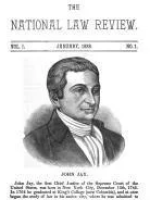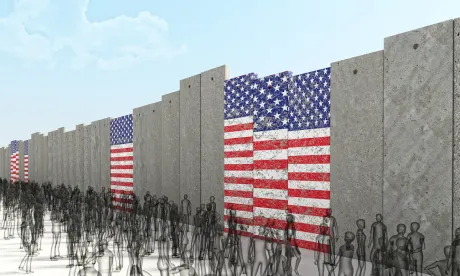Morgan Lewis was recently recognized by the American Immigration Council with the Stephen K. Fischel Distinguished Public Service Award for their commitment to helping ensure legal representation within the United States Immigration system. This year, the focus was on the Immigration Justice Campaign, a joint program with the American Immigration Lawyers Association working to provide a fair day in court for detained asylum seekers. Beth Werlin, the executive director of the American Immigration Council described Morgan Lewis attorneys as “fearless” and says the firm was an exceptional partner. She says, “[Morgan Lewis] invested their legal resources and expertise in a powerful way to ensure access to justice for detained immigrants, including families separated at the border. They answered the call--during one of America’s darkest moments--to ensure that separated families were treated with dignity and received a chance to present their claims in court.”
The partnership between the pro bono efforts of Morgan Lewis and the mission of the Immigration Justice Campaign has created a powerhouse team. This partnership made it possible for individuals in desperate situations to have powerful backup, providing assistance and guidance in navigating a complicated, chaotic system in a complicated, chaotic time. In many ways, the Immigration Justice Campaign empowered people who felt horrified by the family separation policies shown on the news and gave them a way to make a positive impact.
Immigration Justice Campaign
The Immigration Justice Campaign was founded by the American Immigration Lawyers Association (AILA) and the American Immigration Council to fight for due process and justice for detained immigrants. The Trump Administration’s policies have led to higher numbers of detained and deported immigrants, and most of the detained individuals do not have an attorney standing up for their due process rights. One tangible mission of the campaign is to provide detained immigrants with an attorney, which increases the likelihood of success in their petitions by ten. Karen Siciliano Lucas, the Immigration Justice Campaign Director at the American Immigration Council, says, “Only 14% of the more than 400,000 immigrants detained every year have legal representation, and the government’s detention capacity is expanding. We need pro bono allies across the country to help.”
Fortunately, there is a willing cadre of attorneys--and others with skills to support the legal work being done, like interpreters, social workers and law students, who are eager to offer assistance. The Immigration Justice Campaign takes those with the will, and helps ensure they have the resources that empower them to do the work. Lucas says, “We carefully support attorneys who are new to this work with training resources, templates and mentorship to advocate for their clients with confidence.”
To ensure this work does not exist in a vacuum, the Immigration Justice Campaign also encourages attorneys to speak out publicly on these issues in a variety of ways. Lucas says, “We also seek to educate our pro bono attorneys about the latest immigration policies so they can effectively speak out. . .with Members of Congress, social media and submit comments on proposed regulations to administrative agencies.” These avenues provide a variety of ways to effect change, from educating communities on the immigration policies and why they should change, to parlaying their experiences representing separated parents in El Paso to provide declarations for complaints with the Department of Justice regarding obstructions of justice in El Paso.
Morgan Lewis: Firm-Wide Collaboration to Make a Difference
Morgan Lewis is a global law firm with more than 2,200 attorneys with offices across North America, Asia, Europe, and the Middle East with a fierce dedication to pro bono work. Alison Sclater, pro bono counsel at Morgan Lewis, says, “we encourage pro bono participation by challenging every attorney to perform at least 20 hours of pro bono service every year.” In 2018, the firm just missed clocking a 100% participation rate on their pro bono challenge, with attorneys averaging 60 hours of pro bono work a year. Sclater says, “we are deeply committed to the idea that every lawyer has an ethical duty to give back . . . by using his or her unique skills to provide direct legal services to those who cannot afford to pay for them.”
The pro bono work Morgan Lewis attorneys take on is complicated and complex; however, the firm brings the full force of its resources to the cases. Sclater says, “through our pro bono practice, we have also developed internal expertise in areas such as immigration, and have a network of experienced attorneys to advise on cases as well as a vast resource library of sample briefs and pleadings.” By harnessing the resources of a world wide law firm, and partnering with groups like the Immigration Justice Campaign, Morgan Lewis attorneys are able to make meaningful contributions to individuals in difficult situations.
Furthermore, the pro bono work can be enriching experiences, both professionally and personally. For many junior attorneys, the pro bono experience is an entry into having their own client and serving as the lead attorney in court--leading case strategy, examining witnesses and delivering oral arguments. Sclater says, “The time and energy put into pro bono matters clearly helps them hone their craft as lawyers, which pays dividends in their performance on billable matters as well.”
Making an Impact: Two Stories from Morgan Lewis Attorneys on their Pro Bono Efforts
Attorneys at Morgan Lewis are encouraged to work on the issues that speak to them personally. This allowed attorneys like Michelle L. Andrighetto and Carolyn A. Silane to represent detained asylum seekers who were separated from their children in detention. Adrighetto describes the beginning of her pro bono work with a mother separated from her daughter. She says:
It was the summer of 2018 . . . I was deeply troubled by news reports and images of asylum-seeking parents separated from their children along our southern border. . . I wanted to help in some tangible way but wasn’t sure how best to do so. I am a tax attorney in Boston, and know very little about immigration law. What could I possibly do to assist?
Despite her initial concerns, Andrighetto represented an asylum-seeking Brazilian mother and her young daughter. The pair had been separated in a family detention center in Texas after passing a credible fear interview. The mother was given incorrect information regarding her daughter’s whereabouts; specifically, where she was going and how long she would be gone. It took a few weeks and the intervention of the Brazilian consulate to ascertain the daughter’s location. Eventually, the mother learned her daughter was in a shelter outside of Chicago and was suffering emotionally and physically as a result of the trauma of separation.
After weeks of confusion and misinformation, Andrighetto eventually ended up filing an emergency motion with the Seventh Circuit. This was an effort that spanned the firm, involving paralegals and litigators in Chicago who drafted a complaint as well as a Portuguese-speaking associate in Washington DC who acted as translator. Andrighetto went to Texas with the translator, where they helped the mother prepare a declaration that ultimately facilitated the reunification of the mother and child. The pair was released in the middle of the night with nowhere to go, but they were together--and eventually made their way to Boston where they could be among friends and family. Andrighetto says, “Without question, this was the most rewarding experience I’ve had as a lawyer.”
In another situation, Morgan Lewis associate Carolyn A. Silane assisted a father who was separated from his adopted son at the Southern border and immigration officials were denying his parentage. At first brush, it seemed the case would be clear: establish parentage and immigration officials would reunite father and son. To do so, Silane reached out to partners at Morgan Lewis who had connections with local law firms in Honduras, and Silane had an affidavit written by one of the local law firm partners that the documents the father had were appropriate to prove parenthood in the Honduras. While this resulted in progress, the case was not closed and father and son remained apart.
To achieve reunification, Silane embarked on a legal battle involving the ACLU, the DOJ, the Center for Constitutional Rights and eventually applied for injunctive relief in the SDNY to facilitate the end of the separation. Finally, eventually, a judge agreed that there was no basis to keep father and son apart, and a judge ordered the child released to the father. Silane says, “This is not like any legal battle I’ve ever fought. There was literally someone’s life on the line. Each day we weren’t successful meant another day that a two-year old child spent in federal custody away from his dad.”
Collaboration and Teamwork: Morgan Lewis and Immigration Justice Campaign
The partnership between Morgan Lewis and the Immigration Justice Campaign helps ensure that both groups are able to accomplish their goals. By ensuring attorneys working pro bono matters have the support they need, the Immigration Justice Campaign accomplishes its goal of increasing representation in detention centers and Morgan Lewis attorneys who are interested in issues affecting detained asylum seekers are able to make significant contributions in that area.
Through careful structuring of workflow, the Immigration Justice Campaign has made it possible for attorneys to have a positive impact, without committing to managing a case from start to finish. Sclater says, “The Justice Campaign has also been very creative in their approach to engaging more pro bono attorneys in detention work--developing projects that can be handled remotely . . . enabling pro bono attorneys to help with a small but critical piece of someone’s case, even if they can’t commit to full representation.” These projects include preparing parole requests to seek release for detained asylum seekers, conduct country conditions research for pro se asylum seekers, and represent immigrants seeking release on bond, all which can be done semi-remotely or completely remotely. Additionally, the Justice Campaign recruits translators, mental health professionals, and physicians to provide documentation crucial to the immigration cases, and providing support for the attorneys.
There is much work to do, and it doesn’t appear that will be changing anytime soon. In the meantime, attorneys like Silane and Andrighetto are able to work hard on behalf of asylum seekers in detention, supported by their law firm and the efforts of the Immigration Justice Campaign. Andrighetto says, “I am so overwhelmed by the generous spirit of the people at Morgan Lewis, and so proud of what we can achieve when we work together.”
Learn more about the Immigration Justice Campaign and volunteer opportunities and the great pro bono work getting done at Morgan Lewis.




 />i
/>i

